
To inculcate the importance of sleep, World Sleep Day, an event organized by the World Sleep Day Committee of the World Sleep Society, formerly World Association of Sleep Medicine (WASM), since 2008, celebrated on Friday, before the northern hemisphere vernal equinox. Most of us compromise with our sleep and miss to understand the benefits of good night sleep. On World’s sleep day I thought to share some tips to ensure deep sleep at night. Let’s read, why do we need sound sleep and how we can attain it?
A good laugh and a long sleep are the best cures in the doctor’s book.
— Irish proverb
Why do we Need Sound Sleep?

Sleep is an important function which our body needs to get relaxed and to work efficiently; in a nutshell, it plays a crucial role in attaining good health throughout your life. If you are deprived of sound sleep for a continuous period, your mental and physical health is going to suffer the utmost, and chances are brighter to have some chronic health issues. While sleeping, your body works to support your brain function and maintain your physical health. Here are some reasons why do you need a good sound sleep further discussing some tips to ensure deep sleep.
- A sound sleep assists in the healing and repairing of your heart and blood vessels. Sleeping less than 7–8 hours every night is associated with an increased risk of stroke and heart disease.
- Lack of quality sleep can increase the risk of obesity; it is linked to higher body weight in both children and adults.
- Sleep deficiency can affect how you think, react, work, learn, and behave with others.
- Being deprived of sleep, you may have to juggle while making any decisions, resolving intricacies, regulating your emotions and behavior, and coping with any changes.
- Sleeping disorder can lead to depression, stress, anxiety, suicide, and risk-taking behavior.
- Quality sleep helps in maintaining a healthy balance of hormones. Inadequate sleep affects hormones that regulate appetite. People who don’t get enough sleep tend to eat higher calories than those who get adequate sleep.
- Lack of sleep affects the hormone insulin, which controls your blood sugar level; if you are not getting proper sleep, the chances of diabetes are on the higher side.
- Quality and deep sleep trigger the body to release the hormone, supporting normal growth and development in teens and children.
- Quality sleep also impacts the immune system; if you are deprived of sleep, your immune system gets weaker to fight some common infections.
- Sleep deficiency makes you less productive at school and the workplace.
- Lack of sleep can cause tragic accidents; data shows slumberous drivers feel incapable of driving.
- Lack of sleep can cause long-term inflammatory issues in your body.
How to Get Good Deep Sleep?
Getting sound sleep is relatively easy; if you believe in self-care and have compassion for yourself, you can do it. No one wants to be sick or less efficient, so working on how to get a good sleep is a must for you. Let’s read these tips to ensure deep sleep or getting an adequate amount of sleep,
1. Follow Circadian Rhythm

Maintain a natural sleep-wake cycle or circadian rhythm. Plan your time to manage your sleep cycle. Your body’s circadian rhythm works on a set pattern, regulating itself with sunrise and sunset. Being regular with your sleep and waking process can serve long-term sleep quality. Increase daily natural sunlight or bright light exposure during the day; it improves your daytime efficiency and energy as well as keeps your circadian rhythm healthy. It maintains a tab on your nighttime sleep quality and duration, especially if you have severe sleep issues or insomnia.
2. Ditch the Blue Light
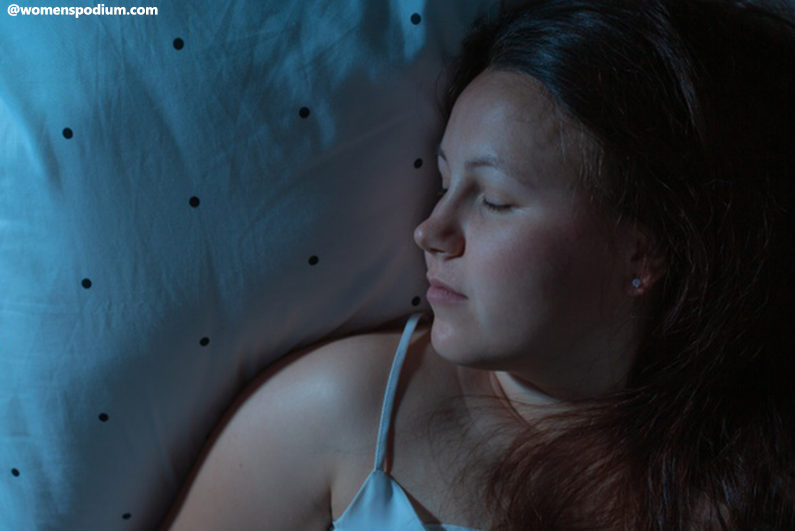
Due to circadian rhythm, your brain follows a signal, so get rid of blue light in the evening as it can trick your body into thinking it’s daytime. Bright light exposure works it’s best during the day, but it has the opposite effect at night hours— it reduces hormones like melatonin, helping you rest and get deep sleep. The most common electronic devices, like smartphones and laptops, emit blue lights in large amounts and are worst in the case of sleep. Follow these small things to ditch blue light:
- Make sure to wear glasses while working at night on a computer or cell phone.
- Install an app that helps in blocking the blue light on your smartphone, laptop or computer.
- Make a habit of switching off the bright light and stop watching TV 2 hours before going to bed.
3. Exercise Regularly

Among various healthy lifestyle choices, exercise holds a special place. Those who exercise routinely get sound sleep at night and feel less sleepy during the daytime. Exercise influences and increases the effect of natural sleep hormones, melatonin. Exercising too close to bedtime can be stimulating, so you must observe the timing of your workouts. The morning workouts are said to be an ideal one, but the fact is, the more intensely you exercise, the more potent the sleep benefits are. However, walking 10 minutes a day, or going for a brisk walk daily or following an exercise routine of three-and-a-half hours a week — improves sleep quality. Exercise is among some of the best tips to ensure deep sleep at night, so do make it a part of daily life.
4. Reserve Your Bed for Sleep & Keep it Comfortable

Make sure to use your bed for sleeping only. Some people make it a workplace for responding to phone calls and replying to emails. If possible, make your bedroom free from being a TV Zone; it creates distraction and disturbance — you must avoid watching late-night TV shows. Make sure to set your bedroom temperature; you can test different temperatures to find out the most comfortable one for you. A bed must act as a stimulus for sleeping, not for restlessness. Get a comfortable bed, mattress, and pillow; your bedroom must be comfortable — a quiet, dark, calm environment push to confront sleep onset. Even following a bedtime ritual can benefit you—drink a warm glass of milk, listen to soothing music or take a shower before bed; these all will give your body a signal that it’s the time to sleep.
5. Keep a Tab on Your Eating Habits

Your eating habits play an immense role in your sleep pattern, especially during the hours before bedtime. Either you have an empty stomach or an over-full tummy; both can despoil your sleep cycle. It is best if your dinnertime is earlier in the evening, you must avoid eating a big meal within 2-3 hours of bed. Cut back on spicy or acidic foods, sugary foods, and refined carbs; they can cause stomach trouble, heartburn, trigger insomnia and hamper your deep sleep, pulling you out of restorative stages of sleep. If you feel hungry right before bed, opting for a small healthy snack is advisable, such as an apple, your favorite fruit, or a warm cup of milk; make sure chocolate or any sugary item shouldn’t be part of your light snack.
6. Avoid Consuming Alcohol and Caffeine

If you drink at night, you are at fault. Make sure to limit the caffeine and nicotine even during the day hours; some facts suggest that caffeine can cause sleep deprivation even up to 10-12 hours after drinking it. Caffeine and smoking are stimulants that can meddle your sleep cycle, especially when taking them before or close to bedtime. Also, you must avoid alcohol before bed; although for some people, wine helps to relax, actually it disrupts your sleep cycle once you’re out. Also, avoid drinking too many liquids in the evening, which may result in frequent bathroom trips throughout the night.
7. Keep Check on Sleep Disrupters
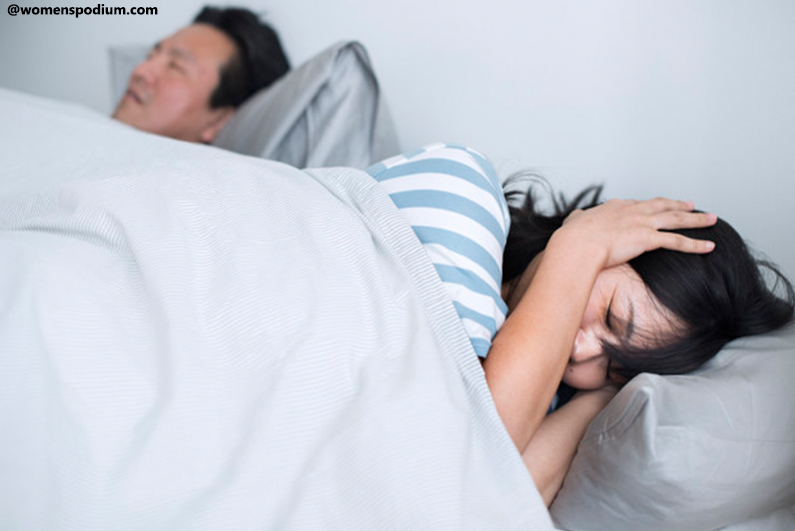
The three most common sleep disrupters—restless legs syndrome (urge to move your legs), sleep apnea (snoring), and gastroesophageal reflux disease or GERD (burning pain in your stomach, chest, or throat) can intrude on your sleep. If these unhealthy symptoms keep you awake at night or make you sleep during the day, it’s high time to consult your doctor for an evaluation. These sleep disrupters can cause irregular sleep patterns and long daytime naps, further disrupting your night sleep quality.
8. De-Stress Yourself!

Keeping yourself free from stress can help you attain good sleep; stress is a stimulus; it activates the fight-or-flight hormones that hinder your sleep. You may get tensed due to work overload, to-do list, or heavy EMI or bills, and taking stress will not solve it—give time to yourself and unwind from all the thoughts floating in your mind. Try to relax, go for deep breathing exercises—inhale slowly and deeply, and then exhale. You can try meditation or yoga for inner peace. Yoga is good for the body and mind both.
Sleep is essential for every one of us to which we take for granted many times. We forget that it is going to deteriorate our health in the end. On the occasion of World’s Sleep Day, I thought to put together the pros and cons of good sleep. I hope that the above-mentioned tips to ensure deep sleep can help you to understand and value it. Let’s take a pledge today to give our sleep its proper place in our life.
10 Quotes on World’s Sleep Day
Sometimes a long explanation fails to make you connect the dots, whereas quotes have the power to tell a whole big story in one or two lines. Let’s read some quotes about sleep to celebrate the world’s sleep day.
Sleep is the best meditation.
—The Dalai Lama
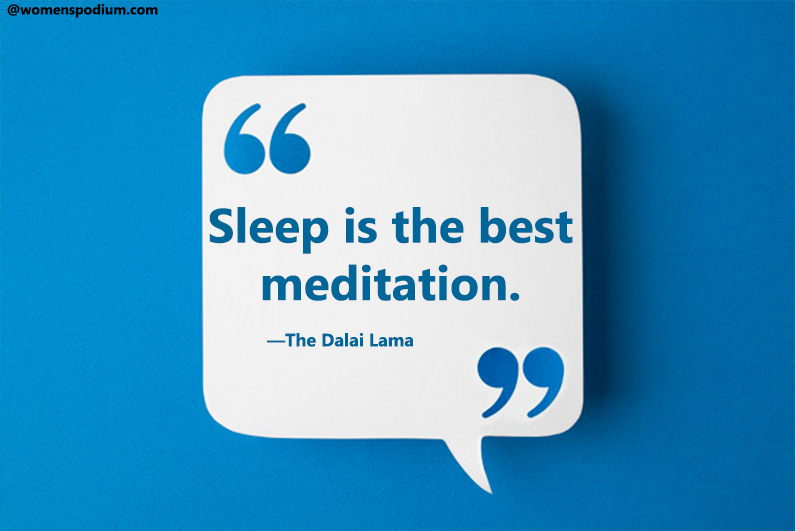
Early to rise, early to bed, makes a man healthy, wealthy, and dead.
— James Thurber
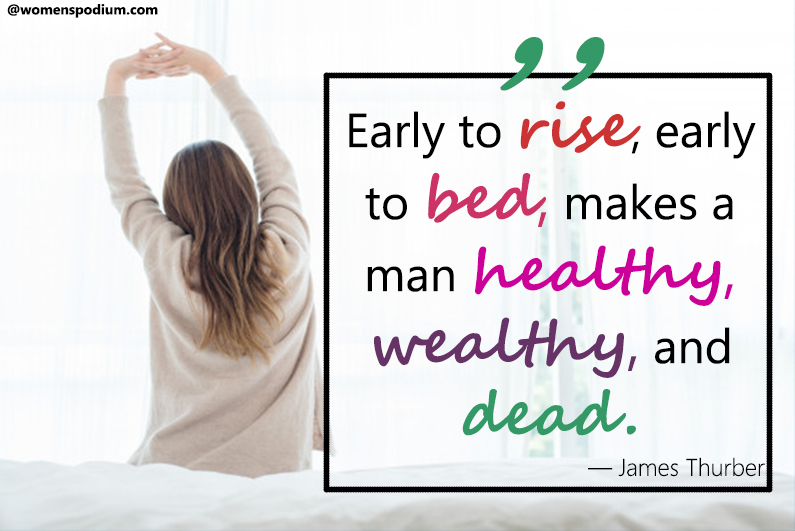
Life is something that happens when you can’t get to sleep.
— Fran Lebowitz

Insomnia is a glamorous term for thoughts you forgot to have in the day.
— Alain de Botton
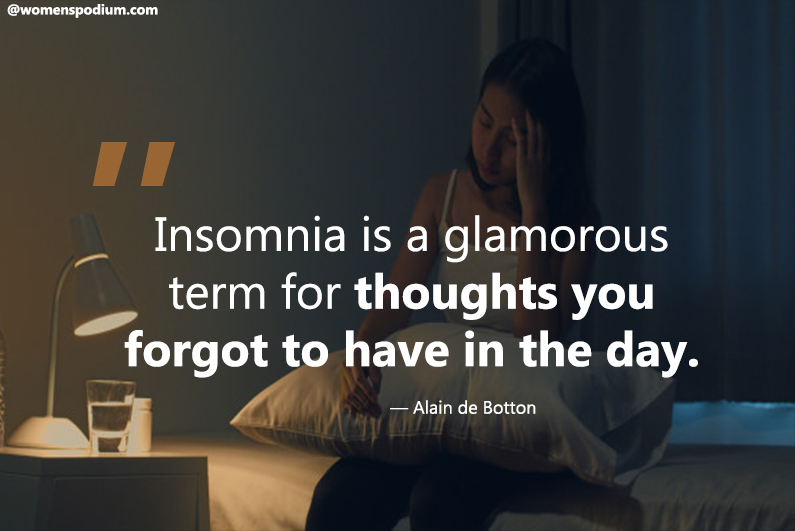
Laugh and the world laughs with you, snore and you sleep alone.
—Anthony Burgess

Man should forget his anger before he lies down to sleep.
— Mahatma Gandhi

Your future depends on your dreams, so go to sleep.
— Mesut Barazany

The worst thing in the world is to try to sleep and not to.
— F. Scott Fitzgerald

Without enough sleep, we all become tall two-year-olds.
— JoJo Jensen

If a man had as many ideas during the day as he does when he has insomnia, he’d make a fortune.
— Griff Niblack






